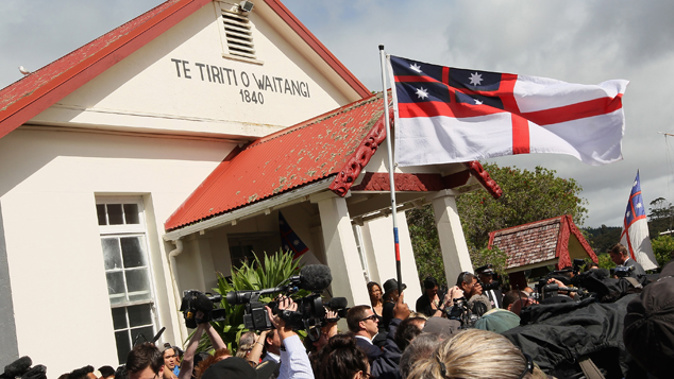
After another Waitangi Day marked by protest and controversy, is it possible that a 'New Zealand Day' could help heal deep divisions between Kiwis? James Robins doesn’t think so.
After weeks of sweet-talking and placating, government spinners and propagandists outrageously underestimated the strength of Māori opposition to the TPP. Expecting to arrive at Te Tii Marae on Waitangi Day with a juicy free trade deal to promote, ministers were instead confronted by a hikoi from Northland which provided a passionate backbone to last Thursday’s anti-TPP march in Auckland.
On the eve of Waitangi, it was an impressive display of resilience and an important reminder. Māori, after all, know something about the erosion of sovereignty by signature, don’t they?
Repulsed by all that skilful mobilisation, the protests proved too much for New Zealand’s ‘silent majority’ who, as you might expect, became suddenly un-silent. The usual demands went out: Death to Waitangi Day! A ‘New Zealand Day’ is needed, they argue, to unite the nation and cure the scourge of ‘separatism’.
This demand is a regular feature in the weeks before Waitangi, but it seemed more combative and drum-beating this time around, buoyed by the Prime Minister’s engineered absence from the Treaty Grounds. The derision directed at “dole-bludgers” and “rent-a-crowds” and “trough-feeders” was on form, however. This language is now accepted, treated as normal, the whisper of condemnation getting quieter every year.
But even less attention was paid to what a ‘New Zealand Day’ might mean, and what it requires us to do. As with all miracle cures, it deserves a healthy degree of suspicion.
Using the same pacifying rhetoric of “oneness” and “understanding” which has mythologised New Zealand’s somewhat chequered race-relations record, a ‘New Zealand Day’ would remove Waitangi – as a place and a founding document – from the veins of national identity. It would forcibly cleanse Māori influence on commemorations, therefore white-washing New Zealand’s bloody colonial past and doing away with need for constant apology.
When stripped of defining history and context, any discussion or debate of national values becomes atomised and fragmented. Without Waitangi, our sense of nationhood is reduced to whimsical nonsense and shallow jingoism. We’ve already had this happen with the flag referendum, a process which so easily forgot Māoridom, and became a farce because of it.
Freed from such antagonisms, ‘New Zealand Day’ would allow us to feel comfortable with the fanciful myth that this country is a paradise. A way to imagine that Aotearoa’s supposed richness comes from hard graft and No.8 wire, not the theft and plunder of a people. A way to forget that even today’s industry still exploits and subjugates on the basis of colour. It liberates white New Zealand to sunburnt beaches or rugby stadiums to drink cheap beer, content that none of those “loonies” and “hate-fuelled weirdos” up North are allowed to get any attention.
The weeks surrounding Waitangi Day, sadly, are perhaps the only time when Māori can air their concerns and have their public part in what Auckland University’s Dr Hirini Kaa described a few weeks ago as a “long and immensely patient movement for justice”. And yet the ideology behind ‘New Zealand Day’ sees this “movement for justice” as a divisive bunch of upsetters, and scolds them for complaining too much, thereby robbing them of dignity and subsuming their identity – a tactic which until very recently was commonplace. What is this if not white supremacy in action?
To borrow (and slightly butcher) a phrase from the esteemed historian James Belich, the attitudes and expressions behind ‘New Zealand Day’ desire to “recolonise” the country, deliberately and relentlessly chipping away at any sense of progress.
A long period of colonialism is probably enough for one country. How we memorialise or mark that history (if indeed colonialism has ‘finished’) is still contentious. In my mind, there is a fundamental misunderstanding which pushes people towards thinking Waitangi ought to be more celebratory. We do not have to be proud of the Treaty, or approve the pageant-like parade of myth-making racial unity. Surely we’re mature enough to sit with the paradoxes of it instead: its position as the document which codified and sanctified industrial-strength theft and pillage, but also the basis for reparations atoning for those past wrongs.
It seems obvious that February 6th ought to be a more solemn occasion. Protest should be expected, not treated as a political plaything by those on the receiving end, nor derided as a deranged voice from the wilderness. That voice, no matter its intonation, serves as a reminder of what has been wrought upon Māori for generations.
Replacing Waitangi Day with a white supremacist dream stirs a certain kind of racist arrogance which papers over those crimes, allowing them to be committed again.
Take your Radio, Podcasts and Music with you









